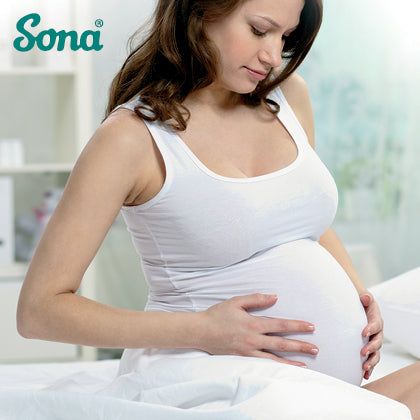
Women are at a higher risk of developing low body stores of iron due to menstruation. A study carried out in recent years indicated that 42% of Irish women could be at risk of iron deficiency.
Pregnant women are at an even higher risk of developing an iron deficiency. Thus, it is vital that they increase their iron intake during pregnancy.
In this article you can find:
- What is iron?
- Why is iron required during pregnancy?
- How much iron should I take during pregnancy?
What is iron?
Iron is an essential mineral we need for growth and development. Iron’s main role in the body is to produce hemoglobin, a protein molecule in red blood cells that transports oxygen from the lungs to the body’s tissues, as well as myoglobin, a protein that provides oxygen to muscles.
Iron can be categorized into two groups, haem iron, and non-haem iron. Haem iron is found in animal products, such as beef, liver, pork, chicken, and fish. Depending on an individual’s iron stores, approximately 15-35% of haem iron is absorbed by the body.
Non-haem iron is predominantly found in plant foods, including beans, broccoli, spinach, nuts, and lentils. However, only 5-15% of non-haem iron can be absorbed.
Consuming foods that are rich in vitamin C, such as berries, peppers, kiwis, broccoli, kale, with non-haem iron can help boost absorption.
Non-haem iron is also sensitive to compounds found in tea, coffee, wine and cocoa, which can ultimately reduce your body’s ability to absorb the iron by 39-90%. Thus, it is important to try not drink these drinks while you are consuming iron rich foods.
Thereby, it is best to avoid tea, coffee, and cocoa at mealtimes and waiting an hour after your meal to drink them in order to promote adequate absorption.
Why is iron important in pregnancy?
During pregnancy, your body requires twice as much iron to produce more blood in order to supply oxygen to your baby.
Iron deficiency in pregnancy heightens the risk of a baby having a low birth weight, as well as premature delivery. Moreover, iron deficiency can also affect the mother after pregnancy, as it may increase feelings of tiredness (which can reduce milk production), irritability, headaches, and decreased immune function. Iron deficiency may also increase the risk of postnatal depression.
How much iron should I take during pregnancy?
Healthy pregnant women should supplement with 16-20mg of iron a day throughout pregnancy. Women with low haemoglobin FBC or serum ferritin will generally require a higher dose of iron, however this would have to be discussed with their doctor.
Sona Iron Complete is a specially formulated, delicious tasting Iron supplement contain 20mg of iron per serving. This supplement also contains comprehensive range of co-factor multivitamins, including manganese, niacin, pantothenic acid, vitamin B1, B2, B6, B12, and vitamin C.
Sona Pregnaplan Complete is a complete multivitamin/multimineral with omega 3 fish oil and also contains the recommended 17mg of iron as well as a comprehensive range of nutrients especially formulated for before, during and after pregnancy.
References
- (HSE, 2021). Retrieved 17 June 2021, from https://www.hse.ie/eng/about/who/acute-hospitals-division/woman-infants/clinical-guidelines/nutrition-during-pregnancy.pdf.
- Georgieff, M., Krebs, N., & Cusick, S. (2019). The Benefits and Risks of Iron Supplementation in Pregnancy and Childhood. Annual Review Of Nutrition, 39(1), 121-146. doi: 10.1146/annurev-nutr-082018-124213.
- Planning a Pregnancy - INDI. (2021). Retrieved 17 June 2021, from https://www.indi.ie/fact-sheets/fact-sheets-on-women-s-health/544-planning-a-pregnancy.html.
- Women and Iron - INDI. (2021). Retrieved 17 June 2021, from https://www.indi.ie/women-s-health/546-women-and-iron.html.
- Young, I., Parker, H., Rangan, A., Prvan, T., Cook, R., & Donges, C. et al. (2018). Association between Haem and Non-Haem Iron Intake and Serum Ferritin in Healthy Young Women. Nutrients, 10(1), 81. doi: 10.3390/nu10010081.
